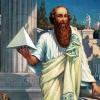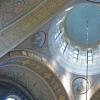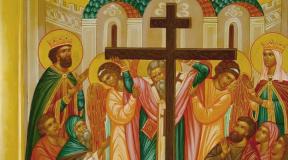Why F Nietzsche criticized Christianity. Nietzsche's Opinion on the Values \u200b\u200bof the Christian Religion (Based on The Anti-Christian)
October 15 is the birthday of Friedrich Nietzsche. Nietzsche is probably the most radical critic of Christianity, he owns the words "God is dead." How do Christian thinkers view him? - and the most interesting: why for many, many Christian thinkers, Nietzsche was more of an "ally"? - why for them the “death of God”, this seemingly so radically atheistic statement, served as a liberating event for the Christian faith? Let's take a look at some examples.
Books
Lev Shestov is a radical religious existentialist who challenged reason and everyday morality in the name of faith in God. And for Shestov, Nietzsche turns out to be the most important ally.
 "Goodness in the teachings of Count Tolstoy and Nietzsche" - an early book by Shestov, where he first clearly expressed his message. The kind humanist Tolstoy, preacher of a rational and moral religion and an atheist, immoralist Nietzsche. Maybe not everything is so obvious? Which of them is closer to the Living God of Scripture, whose Name is terrible? Nietzsche, overthrowing out of nowhere the idols of Reason and Good, a fearless seeker of truth - isn't he closer to Abraham, leaving his homeland and sacrificing his son, to Job with his cry, to Paul with his rejection of the Law, with his "foolishness." What does Tolstoy's “reasonable good” have to do with “madness in Christ”?
"Goodness in the teachings of Count Tolstoy and Nietzsche" - an early book by Shestov, where he first clearly expressed his message. The kind humanist Tolstoy, preacher of a rational and moral religion and an atheist, immoralist Nietzsche. Maybe not everything is so obvious? Which of them is closer to the Living God of Scripture, whose Name is terrible? Nietzsche, overthrowing out of nowhere the idols of Reason and Good, a fearless seeker of truth - isn't he closer to Abraham, leaving his homeland and sacrificing his son, to Job with his cry, to Paul with his rejection of the Law, with his "foolishness." What does Tolstoy's “reasonable good” have to do with “madness in Christ”?
Shestov in his book "Goodness in the Teachings of Count Tolstoy and F. Nietzsche" recalls that Christianity is not at all "rosy", in fact, about the formula "The fear of God is the beginning of wisdom." Here is Shestov's message, which believers should never forget: “We need to look for something that is higher than compassion, higher than good. We must seek God " .
 “Dostoevsky and Nietzsche. Philosophy of Tragedy " - one of the best books by Shestov. Dostoevsky and Nietzsche are often compared. This is understandable: no matter how different their paths were, both were not afraid to reach the edge, look into the abyss. And this always means: to draw closer to God. The “death of God” proclaimed by Nietzsche, according to many interpretations (including Shestov), \u200b\u200bwas the death of the New European God - the God of humanistic morality, the convenient God of the system, the God of philosophy - the “moral and metaphysical God”, not the God of Scripture and the Church. Dostoevsky followed the same path (when, for example, he said that he would choose Christ, and not the truth - that is, the Living God, and not a metaphysical judgment).
“Dostoevsky and Nietzsche. Philosophy of Tragedy " - one of the best books by Shestov. Dostoevsky and Nietzsche are often compared. This is understandable: no matter how different their paths were, both were not afraid to reach the edge, look into the abyss. And this always means: to draw closer to God. The “death of God” proclaimed by Nietzsche, according to many interpretations (including Shestov), \u200b\u200bwas the death of the New European God - the God of humanistic morality, the convenient God of the system, the God of philosophy - the “moral and metaphysical God”, not the God of Scripture and the Church. Dostoevsky followed the same path (when, for example, he said that he would choose Christ, and not the truth - that is, the Living God, and not a metaphysical judgment).
Shestov "defines" the philosophy of tragedy: “Philosophy is the philosophy of tragedy. Dostoevsky's novels and Nietzsche's books only say that about "ugliest" people and their questions. Nietzsche and Dostoevsky, like Gogol, were themselves the most ugly people who had no ordinary hopes. They tried to find their own where no one ever seeks, where, according to the general conviction, there is and cannot be anything but eternal darkness and chaos, where even Mill himself suggests the possibility of action without a reason. There, perhaps, every underground person means as much as the whole world; there, perhaps, people of tragedy will find what they were looking for ... People of everyday life will not want to cross in pursuit of such an incredible “maybe” fatal line. "
 Nietzsche is known as the greatest anti-Christian philosopher. Jaspers in his little research "Nietzsche and Christianity" shows that Nietzsche's attitude to Christianity is not at all so simple.
Nietzsche is known as the greatest anti-Christian philosopher. Jaspers in his little research "Nietzsche and Christianity" shows that Nietzsche's attitude to Christianity is not at all so simple.
The general logic of the relationship between Nietzsche and Christianity is outlined by Jaspers as follows:
"The capture of Nietzsche by Christian impulses, then - their use in the struggle against Christianity and, finally, a turn around, in which everything that was positively affirmed in spite of the previously rejected Christianity is rejected - this movement constitutes the basic structure of Nietzsche's thinking."
 "Idol and Distance" - the first book of perhaps the greatest thinker of our days - Jean-Luc Marion. An attempt is made here to think of God with the help of phenomenological philosophy. God after the "death of God", God outside of metaphysics, ontotheology, etc.: God, not an idol, the God of apophatic theology. One cannot do without Nietzsche - and the first part of the book is devoted to him. Nietzsche in the "death of God" proclaims the overthrow of metaphysics, the death of "God" as a concept, thereby liberating faith in the God of Scripture:
"Idol and Distance" - the first book of perhaps the greatest thinker of our days - Jean-Luc Marion. An attempt is made here to think of God with the help of phenomenological philosophy. God after the "death of God", God outside of metaphysics, ontotheology, etc.: God, not an idol, the God of apophatic theology. One cannot do without Nietzsche - and the first part of the book is devoted to him. Nietzsche in the "death of God" proclaims the overthrow of metaphysics, the death of "God" as a concept, thereby liberating faith in the God of Scripture:
“The time has come to ask ourselves: since Nietzsche did not at all proclaim any militant atheism, how prudently, trying to make him an ally, stupid ideologies assert, was not he the one who, along with the madman,“ seeks God, calling out to God ”? Was he — in an even more bizarre way — “the last German philosopher who sought God with passion and suffering” (Heidegger)? "Not to overturn the idol, but to kill the idolater in yourself: this is your courage" (Dithyramby ..., 202). To kill an idolater in oneself means: to live in a non-idolatric space in order to boldly, face to face, approach the divine, mysteriously overshadowing these fields. "
 "Heidegger and Areopagite, or On the Absence and Unknowability of God" - a masterpiece of modern Orthodox thought. Nietzsche and his message of "the death of God" are one of the main themes of the book. "Death of God" is not Nietzsche's personal opinion, it is simply a statement of a fait accompli in Western history, a natural product of the West's departure from the Church in the first centuries:
"Heidegger and Areopagite, or On the Absence and Unknowability of God" - a masterpiece of modern Orthodox thought. Nietzsche and his message of "the death of God" are one of the main themes of the book. "Death of God" is not Nietzsche's personal opinion, it is simply a statement of a fait accompli in Western history, a natural product of the West's departure from the Church in the first centuries:
“The preaching of Nietzsche is an indirect, but quite clear expression of the fundamental“ heresy ”- a deviation from the original event of the Church. This deviation constituted the historical temptation of Western Christianity, manifested in sophisticated intellectual and social coercion and, ultimately, in the "religiousization" of the Church, that is, in turning it into a religious institution that provides an individual with emotional and intellectual guarantees by maintaining the moral and practical expediency of social life. The differences between Western Christianity and the unified Church of the first centuries (in dogma, cult, art, organization) together led to a radical distortion of the ecclesiological self-consciousness and identity of Western Christians. "
 "After Christianity" - a book where Wattimo comprehends the very possibility of faith in the modern era, paradoxically formulating his position as "Believe what you believe"... For Vattimo, as for many Christian thinkers, the “death of God” is a positive event for Christians:
"After Christianity" - a book where Wattimo comprehends the very possibility of faith in the modern era, paradoxically formulating his position as "Believe what you believe"... For Vattimo, as for many Christian thinkers, the “death of God” is a positive event for Christians:
“My intention is rather to show how exactly the pluralism of the postmodern era allows (me personally, but I believe that we can talk about the situation in general) to regain the Christian faith. So, if God is dead, and therefore philosophy has realized that it can no longer hope to grasp the final foundation for sure, then at the same time the “need” for philosophical atheism has also disappeared. Only the philosophy of the "absolute" can consider itself entitled to reject religious experience. But perhaps something even more important should be seen in Nietzsche's proclamation of the death of God. God died, writes Nietzsche, because those who believe in him - his subjects - killed him, that is, they learned not to lie, because it was his covenant, and in the end they realized that God himself is just an unnecessary lie. But in the context of our experience of the postmodern era, this means the following: precisely because God - the last foundation, that is, the absolute metaphysical structure of reality - is now lost, faith in God becomes possible again. "
Articles
 "Freedom and Truth in Nietzsche" - an article by Shlomo Pines, which emphasizes the relationship between Nietzsche and the Apostle Paul (however, Pines is far from the only one who noticed this relationship).
"Freedom and Truth in Nietzsche" - an article by Shlomo Pines, which emphasizes the relationship between Nietzsche and the Apostle Paul (however, Pines is far from the only one who noticed this relationship).
“The freedom preached by Paul quite accurately corresponds to what Nietzsche called freedom,“ turned inward ”(internalized), responsible for the emergence of such a promising, according to the philosopher, the phenomenon of“ troubled conscience ”. Yet, despite the clear similarities here, Paul was one of Nietzsche's most antipathy characters in history.
It seems to me, however, that there is every reason to see in Nietzsche himself (using his own formulation) a tendency towards a personal "interiorization of freedom", to a large extent similar to what he dismissively called among others "a slave revolt in the sphere of morality", seeing in Pavle is one of the archetypal cases of such a rebellion.
According to one of the passages [Nietzsche], human freedom - no matter whether a skeptic, an atheist, a nihilist, rejecting morality, religion, etc., but at the same time retaining faith in the possibility of knowing the truth - is still incomplete freedom. In the words of Nietzsche: "Such people are far from being free spiritual beings, for they still believe in the truth." Freedom, or rather, its specific interiorized variety, cannot bear any restrictions. Its implacable logic ultimately demands liberation from the Truth, as in his time Paul was supposed to free himself from the Law ”,
 In the book "Religion after Atheism" Epstein examines the new possibilities of religion that opened up to her after "the death of God." Epsteinovskaya "Theology of Life" is devoted “The problematics that were initially put forward by Nietzsche's philosophy of life under the sign of atheism or theomachy. For Nietzsche, the death of God is a necessary condition for the triumph of life: "The concept of 'God' is invented as the opposite of the concept of life - in it everything harmful, poisonous, slanderous, all mortal enmity towards life is reduced to a terrifying unity!" One of the lines of the theological rethinking of atheism is to re-bring "God" and "life" closer together, to show the indivisibility of "the living God." It is the return to the Tree of Life from the Tree of the Knowledge of Good and Evil that determines the vector of the biblical narrative, which can be traced through the Book of Job, the Book of Ecclesiastes and the Song of Songs. The problem of life in its deep absurdity and unknowability is interpreted here within the framework of biblical theology, which turns out to be much closer to the worldview of a modern person, a “post-atheist,” than is commonly thought ”.
In the book "Religion after Atheism" Epstein examines the new possibilities of religion that opened up to her after "the death of God." Epsteinovskaya "Theology of Life" is devoted “The problematics that were initially put forward by Nietzsche's philosophy of life under the sign of atheism or theomachy. For Nietzsche, the death of God is a necessary condition for the triumph of life: "The concept of 'God' is invented as the opposite of the concept of life - in it everything harmful, poisonous, slanderous, all mortal enmity towards life is reduced to a terrifying unity!" One of the lines of the theological rethinking of atheism is to re-bring "God" and "life" closer together, to show the indivisibility of "the living God." It is the return to the Tree of Life from the Tree of the Knowledge of Good and Evil that determines the vector of the biblical narrative, which can be traced through the Book of Job, the Book of Ecclesiastes and the Song of Songs. The problem of life in its deep absurdity and unknowability is interpreted here within the framework of biblical theology, which turns out to be much closer to the worldview of a modern person, a “post-atheist,” than is commonly thought ”.
 In the book "Conflict of interpretations", in her section "Religion, Atheism, Faith", Ricoeur writes in line with the ideas about which a lot has already been said above:
In the book "Conflict of interpretations", in her section "Religion, Atheism, Faith", Ricoeur writes in line with the ideas about which a lot has already been said above:
“Now the question is more urgent and perplexing than ever: can we admit any religious significance atheism? Of course not, if we take the word "religion" in the narrow sense - in the sense of the archaic attitude of man to the threatening will of the Holy One; but if it is true that "only the moral God is rejected," then the path is open before us - a path full of doubts and dangers that we will try to follow. "
In April 1864, Nietzsche wrote two philosophical and poetic essays: "Rock and History" and "Free Will and Rock", which contain almost all the main ideas of his future works. In the second essay, Nietzsche's sharp attacks on the Christian idea of \u200b\u200bthe other world seem to be the most remarkable: “The fact that God becomes man indicates only: man should seek his bliss not in infinity, but create his own heaven on earth; the illusion of an unearthly world distorted the relationship of the human spirit to the earthly world: it was the creation of the childhood of nations. In grave doubts and battles mankind matures: it realizes in itself the beginning, core and end of religions. "
These thoughts will develop, of course, much later. In 1882, Nietzsche wrote Gay Science in Genoa, in one of the fragments of which - "The Mad Man" - the theme of "the death of God" arises, the authority of God and the Church disappears, in their place comes the authority of conscience, the authority of reason. In 1883, Nietzsche wrote the book Thus Spoke Zarathustra in just a few months, the first part of which ends with the words: “All gods are dead; now we want the superman to live. "
The superman of Nietzsche is the result of the cultural and spiritual perfection of man, a type that is so superior to modern Nietzsche man that he forms a new and special biological type. Superman is a moral image, meaning the highest stage of the spiritual flourishing of humanity, the personification of new moral ideals, this superman comes to the place of the deceased God, he must lead humanity to perfection, must restore in force all the qualities of man.
Nietzsche attacked one of the main tenets of the Christian faith in eternal existence by the grace of God in the afterlife. It seemed absurd to him that death should be the atonement for the original sin of Adam and Eve, he expressed the amazing idea that the stronger the will to live, the more terrible the fear of death. And how can you live without thinking about death, but knowing about its inexorableness and inevitability, not being afraid of it?
In the face of death, few will find the courage to say that there is no God.The dignity of the superman arises from overcoming the fear of death, but in a completely different way than in Christianity. While the Christian is not afraid of death, since he believes in the eternal life given to him by God, the superman Nietzsche is not afraid of death, although he does not believe in either God or immortality, he himself feels God. Nietzsche says that the courageous supreme man “with pride” contemplates the abyss. People believe in God only because they are afraid of death. The one who overcomes the fear of death will become God himself.
In past centuries, people embodied their dream of perfection in the idea of \u200b\u200bthe existence of God as a supreme and perfect person and thus recognized the impossibility of achieving perfection, for God is an otherworldly, inaccessible, incomprehensible being.
The death of God was required by Nietzsche to establish the life of the superman as the highest ideal of man's earthly existence. Nietzsche's superman appears as an earthly, this-worldly and seemingly quite attainable ideal, striving towards which a person acquires a real opportunity to overcome his imperfect state and become higher than himself.
What do the words "God is dead" mean? - The fact that the world has lost its meaning. This means that it is necessary to fill the world with a different meaning, to establish new ones instead of dead values. “All the gods have died, now we want the superman to live,” says Zarathustra. The death of God opens up the possibility of freedom to create new values \u200b\u200band a superman.
What did Nietzsche blame Christianity for? In the fact that Christianity is a religion of compassion, the religion of weak and sick people, that Christianity leads to the lack of freedom and non-resistance of man, that Christianity operates entirely with imaginary concepts, that it raises the "sinfulness" of man and that, finally, religion and science are incompatible.
Christianity picked up the true, supersensible, otherworldly world of higher ideals, norms, principles, goals and values, fictionalized by Plato, which was raised above earthly life in order to give the latter order and inner meaning. Since the other world was understood as perfect, unconditional, absolute, true, kind, beautiful, desirable, insofar as the earthly world, in which people live with all their affairs, worries, difficulties and hardships, was presented as only seeming, imperfect, unreal, deceptive, a vicious world.
The artificially erected true world appeared in the minds of people as a kind of ideal, which was given the appropriate attributes in the form of various values \u200b\u200band goals, and which, in this regard, became the basis for criticism of the earthly world known to us, for the former seemed more valuable and significant than the latter.
In this regard, Nietzsche opposed the recognition of the existence of an ideal world. The really existing world is the only world, and a certain “ideal world” is a kind of repetition of the existing world. This ideal world is a healing, comforting world of illusions and fictions, this is all that we appreciate and feel as pleasant. He is the source of the most dangerous attempts on life, the greatest doubts and all kinds of devaluation of the world that we represent. Thus, earthly life becomes devoid of meaning and value and begins to be rejected.
Moreover, the "perfect" world, according to Nietzsche, was created on the basis of the suffering and powerlessness of people. Those who despise body and earth for the sake of the other world are the sick and dying. In the depths of Christianity lives the hatred of sick people, an instinct directed against healthy people. Lacking independence, health, intellectual abilities, physical strength, commoners, weak, sick, tired, outcast, disadvantaged, mediocre, losers use Christian morality to justify a lack of power and self-confidence and to fight strong and independent people.
It is they, “decadent people,” not strong personalities, who need mutual help, compassion, mercy, love from others, and humanity. Without this, they simply would not have been able to survive, and even more so to impose their dominance and avenge themselves and for their innate deficiency and inferiority. Higher people, however, such moral values \u200b\u200bare not only unnecessary, but also harmful, because they weaken their souls. They therefore share values \u200b\u200bof the opposite nature, which are associated with the assertion of the instinct of the will to
life and power.
In Beyond Good and Evil, Nietzsche writes that "wherever a religious neurosis appears on earth, we encounter it in connection with three dangerous dietary prescriptions: loneliness, fasting, and sexual abstinence."
We can also recall the well-known position of Nietzsche, which causes a lot of controversy: "Push the falling one." What is the meaning of the philosopher in this in itself unsightly thesis? Nietzsche primarily has in mind the criticism of Christianity in
Compassion for someone, a person weakens himself. Compassion multiplies
loss of strength, suffering is already costly. Nietzsche believes that compassion paralyzes the law of development - the law of selection, when the weak and sick must die to make way for the strong and healthy; compassion sustains life in that which is ripe for destruction. Therefore: “Let the weak and the ugly perish - the first commandment of our philanthropy. We must also help them perish. What is more harmful than any vice? - to sympathize with the weak and the crippled - Christianity. "
Any religion arose out of fear and need, when people did not know anything about nature and its laws, everything was a manifestation of mystical forces that could be pacified through prayers and sacrifices. Nietzsche writes that Christianity does not touch reality at any point, in religion there are completely invented concepts: God, soul, spirit, sin, punishment, redemption, grace, final judgment, eternal life.
Christianity contrasts the spiritual (clean) and the natural (dirty). And, as Nietzsche writes, "this explains everything." Who has reason to hate the natural, the real? -– The one who suffers from this reality. And the weak and sick suffer from reality, whom compassion keeps "afloat".
The Church raises the sick or madmen to the rank of saints, and the "higher" states of the soul, religious ecstasy, remind Nietzsche of epileptoid states.
Christianity arose to make life easier for a person, but now it must first burden their life with the consciousness of sinfulness, in order to then be able to facilitate them. The Church has arranged everything in such a way that without her now not a step: all natural events (birth, wedding, death) now require the presence of a priest who would “sanctify” the event. Christianity preaches the sinfulness and contempt of man in general, so that it is no longer possible to despise other people. By putting forward excessive demands, comparing a person with a perfect God, the church makes a person feel sinful, bad, he needs supernatural powers to remove this burden in order to “be saved” from “sinfulness,” but when the idea of \u200b\u200bGod disappears, then feeling disappears. "Sin" as a violation of divine precepts.
Instinctive hatred of reality, rejection of antipathy, enmity, as a consequence of pain, only lead to the fact that a person does not want to resist, does not want to fight this reality - and Christianity appears, a religion of love, that is, non-resistance and obedience. “Do not resist, do not be angry, do not call to account. And do not resist evil - to love it. "
Religion is an inhibiting, interfering, negative factor for society. Religion serves the masses, it is a weapon of the rabble and slaves. In Christianity, the hatred of the mob, the common man for the noble, finds expression. God, holiness, love for one's neighbor, compassion are prejudices invented by those whose lives are empty and monotonous. Faith in God does not elevate or spiritualize a person, but, on the contrary, fetters him and deprives him of freedom. A free person does not need God, for he is the highest value for himself.
"Christianity is a revolt of reptiles on the earth against everything that stands and rises: the gospel of the" low "belittles", "Christianity waged a struggle not for life, but for death with a higher type of man, it anathematized all his basic instincts and extracted from them evil. Christianity took the side of everything weak, low, ugly; it made its ideal in opposition to the instincts of preserving life, life in force. "
For Nietzsche, the question of faith is connected with the problem of morality, values \u200b\u200band human behavior. The meaning and purpose with which Nietzsche declared war on Christianity is the abolition of morality. The death of God opens up to man the possibility of creative freedom to create new value worlds. Rebirth lies in death. In place of spiritual values \u200b\u200bassociated with the idea of \u200b\u200bGod, Nietzsche puts diametrically opposite values \u200b\u200barising from the needs and goals of the real life of the superman.
The arrival of the superman is due to the process of the formation of man, the rejection of the existence of God and the moral and religious values \u200b\u200bassociated with it. Hence, in the philosophy of Nietzsche, there follows a total nihilism and a reassessment of all values. Nietzsche sees the purpose of human existence in the creation of something that is higher than a person, namely, in the creation of a superman who must surpass man to the same degree as the latter is superior to the ape.
Taken by himself, a person, due to his imperfection, cannot be a goal for himself. In the chain of development of the living world, he represents a bridge between animals and the superman, and therefore the content of his life is transition and death, that is, not the result, but the process of becoming, a person must sacrifice himself to the earth in order for it to become the land of the superman.
Revealing the content of Christian morality, Nietzsche notes that this is the morality of altruism, kindness, love for one's neighbor, compassion and humanism. Since it is a herd morality that does not express the natural life instincts of a single person, insofar as its affirmation and maintenance in people's lives is possible only through coercion. Christian morality is a duty to which all must obey without question.
For such obedience to be realized, the idea of \u200b\u200bGod as the highest moral ideal, authority and judge was needed, who not only prescribes moral norms, but also tirelessly and scrupulously monitors their implementation: punishes sinners (with torture in hell) and encourages the righteous (a serene life in paradise) ... Fear of divine punishment is the main motive of people's moral behavior.
One of the initial and key postulates of Nietzsche's analysis of the characteristics of Christian morality is the thesis that there are innate ranks among people, that is, that people are not equal. In his opinion, depending on the degree of power and fullness of the will to power that individuals have from birth, as well as their physiological superiority, people are divided into two breeds (races) - the lowest (to which the vast majority of people belong) and the highest (an insignificant minority ). Nature itself distinguishes strong in spirit, muscles and mediocre people, of whom there are many more.
In this regard, in morality, the position “what is true for one is true for another” cannot be valid. So, if one person recognizes such moral requirements as “Thou shalt not kill,” “Do not steal,” the other may evaluate them as unfair. Therefore, society should have as many morals as there are among people of ranks (strata).
According to Nietzsche, "there is a morality of masters and a morality of slaves." At the same time, diametrically opposite moral values \u200b\u200barise and are affirmed in the lives of both. Christian morality is a misunderstanding due to the fact that it is designed to defeat passions and instincts in order to correct a person and make him better based on the requirements of reason. However, according to Nietzsche, the rise of virtue is incompatible with the simultaneous growth of intelligence and understanding, and the source of happiness lies not at all in reason, but in life instincts.
Therefore, to abandon passions and instincts in morality means to undermine the root of human life and thereby impart an unnatural state to morality. According to Nietzsche, all morality denies life, because it is aimed at fighting the instincts and drives of man. Christian moralists tried with all their might to drown out, eradicate, snatch out and thereby cleanse the human soul of filth. The reason for this was the fact that passions are often the source of big troubles... In addition, being associated with the desire of people for fleeting pleasures and pleasures, they were presented as a manifestation of the animal nature in a person, therefore, they were evaluated as abnormal and dangerous phenomena.
When an individual is in subjection to his passions, he loses the ability to reasonably control his behavior and thus, albeit temporarily, ceases to be a thinking being. But in a person's life only that is correct and normal that is directed by reason. From this it was concluded that a person cannot be “good” until he is freed from his bad and reprehensible passions.
Christian morality as an instinct of the herd, as a kind of illusion of the genus, is a certain tyranny and oppression in relation to a single person, especially and above all the highest. Forcing him to fulfill his moral duty, it deprives a person of freedom, independence, independence, activity, creativity and makes him sacrifice himself for the future. To be moral means to show obedience and obedience to an ancient established law or custom. Thus, the personality becomes dependent on moral traditions. In this regard, it turns out that only the extent to which she is able to obey is worthy of respect in her.
The moral of duty requires an individual to constantly keep himself in hand, that is, to strictly follow and obey her once and for all established rules, which, in the presence of inevitable manifestations of his inherent natural motives and inclinations, cannot but generate irritability and internal tension. fulfilling the same norms of morality for all, a person turns out to be programmed in his behavior for a certain standard and mode of action, which destroys his individuality, because it does not allow him to express himself.
Duty makes a person work, think, feel without inner need, without deep personal choice, without pleasure, that is, automatically. This leads to the impoverishment of the personality, to its self-denial and denial of its uniqueness. Getting into the sphere of morality, the individual is doomed, in addition, to constant painful dissatisfaction with himself, since he is unable to achieve the moral ideals and goals prescribed to him. A person ceases to belong to himself and strive to achieve his interests, in which the will of his life instincts is expressed. Thus, a person begins to choose and prefer not what he needs, but what is harmful to him.
The moral duty limiting the freedom of the individual through education is introduced into the spiritual world of a person in the form of conscience, which is a consciousness of guilt and at the same time a kind of internal tribunal that constantly forces the individual to be subordinate to society. Conscience is a social duty, that is, a herd instinct that has become an internal conviction and a motive for the behavior of an individual. She condemns the act because it has been condemned in society for a long time.
Rejecting Christian morality, the basic concept of which is the concept of guilt, Nietzsche could not but reject conscience as the consciousness of guilt. For Nietzsche, conscience appears as a purely negative phenomenon, unworthy of any respect. Nietzsche called for the "amputation" of conscience, which in his understanding is only the consciousness of guilt, responsibility, obligation, some kind of judgment.
In place of Christian morality, Nietzsche proposed the morality of egoism, when the behavior of an individual person is extremely liberated. Selfishness is a person's way of living at the expense of others. For the egoist, others matter only as means. The goal is he himself, always and under any circumstances. Selfishness is the main point in the art of self-preservation of the personality and its becoming itself. Only in the morality of egoism does a person acquire the consciousness of his infinite value.
According to Nietzsche, not everyone should have the right to egoism, but only higher people, with whose life the development of the human race is supposedly connected. Little, weak and mediocre people have no right to selfishness, since it would orient them towards self-affirmation and taking away a place in the sun from higher people. Therefore, “the weak and the losers must perish: the first principle of our love for man. And they should still be helped in this ”.
Christianity imposes an imaginary meaning on life, thereby preventing the identification of the true meaning and replacing real goals with ideal ones. In a world in which “God is dead” and there is no more moral tyranny, man remains lonely and free. But at the same time he becomes responsible for everything that exists, for the mind finds complete liberation only by being guided by a conscious choice, only by taking on certain obligations. And if necessity cannot be avoided, then true freedom lies in its full acceptance. to accept the earthly world and not indulge oneself with illusions about the other world - this means dominating everything earthly.
Nietzsche rejected Christianity because it denies the freedom of the spirit, the independence and responsibility of man, turns unfreedom into an ideal, and humility into a virtue.
In April 1864, Nietzsche wrote two philosophical and poetic essays: "Rock and History" and "Free Will and Rock", which contain almost all the main ideas of his future works. In the second essay, Nietzsche's sharp attacks on the Christian idea of \u200b\u200bthe other world seem to be the most remarkable: “The fact that God becomes man indicates only: man should seek his bliss not in infinity, but create his own heaven on earth; the illusion of an unearthly world distorted the relationship of the human spirit to the earthly world: it was the creation of the childhood of nations. In grave doubts and battles mankind matures: it realizes in itself the beginning, core and end of religions. "
These thoughts will develop, of course, much later. In 1882, Nietzsche wrote Gay Science in Genoa, in one of the fragments of which - "The Mad Man" - the theme of "the death of God" arises, the authority of God and the Church disappears, in their place comes the authority of conscience, the authority of reason. In 1883, Nietzsche wrote the book Thus Spoke Zarathustra in just a few months, the first part of which ends with the words: “All gods are dead; now we want the superman to live. "
The superman of Nietzsche is the result of the cultural and spiritual perfection of man, a type that is so superior to modern Nietzsche man that he forms a new and special biological type. Superman is a moral image, meaning the highest stage of the spiritual flourishing of humanity, the personification of new moral ideals, this superman comes to the place of the deceased God, he must lead humanity to perfection, must restore in force all the qualities of man.
Nietzsche attacked one of the main tenets of the Christian faith in eternal existence by the grace of God in the afterlife. It seemed absurd to him that death should be the atonement for the original sin of Adam and Eve, he expressed the amazing idea that the stronger the will to live, the more terrible the fear of death. And how can you live without thinking about death, but knowing about its inexorableness and inevitability, not being afraid of it?
In the face of death, few will find the courage to say that there is no God.The dignity of the superman arises from overcoming the fear of death, but in a completely different way than in Christianity. While the Christian is not afraid of death, since he believes in the eternal life given to him by God, the superman Nietzsche is not afraid of death, although he does not believe in either God or immortality, he himself feels God. Nietzsche says that the courageous supreme man “with pride” contemplates the abyss. People believe in God only because they are afraid of death. The one who overcomes the fear of death will become God himself.
In past centuries, people embodied their dream of perfection in the idea of \u200b\u200bthe existence of God as a supreme and perfect person and thus recognized the impossibility of achieving perfection, for God is an otherworldly, inaccessible, incomprehensible being.
The death of God was required by Nietzsche to establish the life of the superman as the highest ideal of man's earthly existence. Nietzsche's superman appears as an earthly, this-worldly and seemingly quite attainable ideal, striving towards which a person acquires a real opportunity to overcome his imperfect state and become higher than himself.
What do the words "God is dead" mean? - The fact that the world has lost its meaning. This means that it is necessary to fill the world with a different meaning, to establish new ones instead of dead values. “All the gods have died, now we want the superman to live,” says Zarathustra. The death of God opens up the possibility of freedom to create new values \u200b\u200band a superman.
What did Nietzsche blame Christianity for? In the fact that Christianity is a religion of compassion, the religion of weak and sick people, that Christianity leads to the lack of freedom and non-resistance of man, that Christianity operates entirely with imaginary concepts, that it raises the "sinfulness" of man and that, finally, religion and science are incompatible.
Christianity picked up the true, supersensible, otherworldly world of higher ideals, norms, principles, goals and values, fictionalized by Plato, which was raised above earthly life in order to give the latter order and inner meaning. Since the other world was understood as perfect, unconditional, absolute, true, kind, beautiful, desirable, insofar as the earthly world, in which people live with all their affairs, worries, difficulties and hardships, was presented as only seeming, imperfect, unreal, deceptive, a vicious world.
The artificially erected true world appeared in the minds of people as a kind of ideal, which was given the appropriate attributes in the form of various values \u200b\u200band goals, and which, in this regard, became the basis for criticism of the earthly world known to us, for the former seemed more valuable and significant than the latter.
In this regard, Nietzsche opposed the recognition of the existence of an ideal world. The really existing world is the only world, and a certain “ideal world” is a kind of repetition of the existing world. This ideal world is a healing, comforting world of illusions and fictions, this is all that we appreciate and feel as pleasant. He is the source of the most dangerous attempts on life, the greatest doubts and all kinds of devaluation of the world that we represent. Thus, earthly life becomes devoid of meaning and value and begins to be rejected.
Moreover, the "perfect" world, according to Nietzsche, was created on the basis of the suffering and powerlessness of people. Those who despise body and earth for the sake of the other world are the sick and dying. In the depths of Christianity lives the hatred of sick people, an instinct directed against healthy people. Lacking independence, health, intellectual abilities, physical strength, commoners, weak, sick, tired, outcast, disadvantaged, mediocre, losers use Christian morality to justify a lack of power and self-confidence and to fight strong and independent people.
It is they, “decadent people,” not strong personalities, who need mutual help, compassion, mercy, love from others, and humanity. Without this, they simply would not have been able to survive, and even more so to impose their dominance and avenge themselves and for their innate deficiency and inferiority. Higher people, however, such moral values \u200b\u200bare not only unnecessary, but also harmful, because they weaken their souls. They therefore share values \u200b\u200bof the opposite nature, which are associated with the assertion of the instinct of the will to
life and power.
In Beyond Good and Evil, Nietzsche writes that "wherever a religious neurosis appears on earth, we encounter it in connection with three dangerous dietary prescriptions: loneliness, fasting, and sexual abstinence."
We can also recall the well-known position of Nietzsche, which causes a lot of controversy: "Push the falling one." What is the meaning of the philosopher in this in itself unsightly thesis? Nietzsche primarily has in mind the criticism of Christianity in
Compassion for someone, a person weakens himself. Compassion multiplies
loss of strength, suffering is already costly. Nietzsche believes that compassion paralyzes the law of development - the law of selection, when the weak and sick must die to make way for the strong and healthy; compassion sustains life in that which is ripe for destruction. Therefore: “Let the weak and the ugly perish - the first commandment of our philanthropy. We must also help them perish. What is more harmful than any vice? - to sympathize with the weak and the crippled - Christianity. "
Any religion arose out of fear and need, when people did not know anything about nature and its laws, everything was a manifestation of mystical forces that could be pacified through prayers and sacrifices. Nietzsche writes that Christianity does not touch reality at any point, in religion there are completely invented concepts: God, soul, spirit, sin, punishment, redemption, grace, final judgment, eternal life.
Christianity contrasts the spiritual (clean) and the natural (dirty). And, as Nietzsche writes, "this explains everything." Who has reason to hate the natural, the real? -– The one who suffers from this reality. And the weak and sick suffer from reality, whom compassion keeps "afloat".
The Church raises the sick or madmen to the rank of saints, and the "higher" states of the soul, religious ecstasy, remind Nietzsche of epileptoid states.
Christianity arose to make life easier for a person, but now it must first burden their life with the consciousness of sinfulness, in order to then be able to facilitate them. The Church has arranged everything in such a way that without her now not a step: all natural events (birth, wedding, death) now require the presence of a priest who would “sanctify” the event. Christianity preaches the sinfulness and contempt of man in general, so that it is no longer possible to despise other people. By putting forward excessive demands, comparing a person with a perfect God, the church makes a person feel sinful, bad, he needs supernatural powers to remove this burden in order to “be saved” from “sinfulness,” but when the idea of \u200b\u200bGod disappears, then feeling disappears. "Sin" as a violation of divine precepts.
Instinctive hatred of reality, rejection of antipathy, enmity, as a consequence of pain, only lead to the fact that a person does not want to resist, does not want to fight this reality - and Christianity appears, a religion of love, that is, non-resistance and obedience. “Do not resist, do not be angry, do not call to account. And do not resist evil - to love it. "
Religion is an inhibiting, interfering, negative factor for society. Religion serves the masses, it is a weapon of the rabble and slaves. In Christianity, the hatred of the mob, the common man for the noble, finds expression. God, holiness, love for one's neighbor, compassion are prejudices invented by those whose lives are empty and monotonous. Faith in God does not elevate or spiritualize a person, but, on the contrary, fetters him and deprives him of freedom. A free person does not need God, for he is the highest value for himself.
"Christianity is a revolt of reptiles on the earth against everything that stands and rises: the gospel of the" low "belittles", "Christianity waged a struggle not for life, but for death with a higher type of man, it anathematized all his basic instincts and extracted from them evil. Christianity took the side of everything weak, low, ugly; it made its ideal in opposition to the instincts of preserving life, life in force. "
For Nietzsche, the question of faith is connected with the problem of morality, values \u200b\u200band human behavior. The meaning and purpose with which Nietzsche declared war on Christianity is the abolition of morality. The death of God opens up to man the possibility of creative freedom to create new value worlds. Rebirth lies in death. In place of spiritual values \u200b\u200bassociated with the idea of \u200b\u200bGod, Nietzsche puts diametrically opposite values \u200b\u200barising from the needs and goals of the real life of the superman.
The arrival of the superman is due to the process of the formation of man, the rejection of the existence of God and the moral and religious values \u200b\u200bassociated with it. Hence, in the philosophy of Nietzsche, there follows a total nihilism and a reassessment of all values. Nietzsche sees the purpose of human existence in the creation of something that is higher than a person, namely, in the creation of a superman who must surpass man to the same degree as the latter is superior to the ape.
Taken by himself, a person, due to his imperfection, cannot be a goal for himself. In the chain of development of the living world, he represents a bridge between animals and the superman, and therefore the content of his life is transition and death, that is, not the result, but the process of becoming, a person must sacrifice himself to the earth in order for it to become the land of the superman.
Revealing the content of Christian morality, Nietzsche notes that this is the morality of altruism, kindness, love for one's neighbor, compassion and humanism. Since it is a herd morality that does not express the natural life instincts of a single person, insofar as its affirmation and maintenance in people's lives is possible only through coercion. Christian morality is a duty to which all must obey without question.
For such obedience to be realized, the idea of \u200b\u200bGod as the highest moral ideal, authority and judge was needed, who not only prescribes moral norms, but also tirelessly and scrupulously monitors their implementation: punishes sinners (with torture in hell) and encourages the righteous (a serene life in paradise) ... Fear of divine punishment is the main motive of people's moral behavior.
One of the initial and key postulates of Nietzsche's analysis of the characteristics of Christian morality is the thesis that there are innate ranks among people, that is, that people are not equal. In his opinion, depending on the degree of power and fullness of the will to power that individuals have from birth, as well as their physiological superiority, people are divided into two breeds (races) - the lowest (to which the vast majority of people belong) and the highest (an insignificant minority ). Nature itself distinguishes strong in spirit, muscles and mediocre people, of whom there are many more.
In this regard, in morality, the position “what is true for one is true for another” cannot be valid. So, if one person recognizes such moral requirements as “Thou shalt not kill,” “Do not steal,” the other may evaluate them as unfair. Therefore, society should have as many morals as there are among people of ranks (strata).
According to Nietzsche, "there is a morality of masters and a morality of slaves." At the same time, diametrically opposite moral values \u200b\u200barise and are affirmed in the lives of both. Christian morality is a misunderstanding due to the fact that it is designed to defeat passions and instincts in order to correct a person and make him better based on the requirements of reason. However, according to Nietzsche, the rise of virtue is incompatible with the simultaneous growth of intelligence and understanding, and the source of happiness lies not at all in reason, but in life instincts.
Therefore, to abandon passions and instincts in morality means to undermine the root of human life and thereby impart an unnatural state to morality. According to Nietzsche, all morality denies life, because it is aimed at fighting the instincts and drives of man. Christian moralists tried with all their might to drown out, eradicate, snatch out and thereby cleanse the human soul of filth. The reason for this was the fact that passions are often the source of great troubles. In addition, being associated with the desire of people for fleeting pleasures and pleasures, they were presented as a manifestation of the animal nature in a person, therefore, they were evaluated as abnormal and dangerous phenomena.
When an individual is in subjection to his passions, he loses the ability to reasonably control his behavior and thus, albeit temporarily, ceases to be a thinking being. But in a person's life only that is correct and normal that is directed by reason. From this it was concluded that a person cannot be “good” until he is freed from his bad and reprehensible passions.
Christian morality as an instinct of the herd, as a kind of illusion of the genus, is a certain tyranny and oppression in relation to a single person, especially and above all the highest. Forcing him to fulfill his moral duty, it deprives a person of freedom, independence, independence, activity, creativity and makes him sacrifice himself for the future. To be moral means to show obedience and obedience to an ancient established law or custom. Thus, the personality becomes dependent on moral traditions. In this regard, it turns out that only the extent to which she is able to obey is worthy of respect in her.
The moral of duty requires an individual to constantly keep himself in hand, that is, to strictly follow and obey her once and for all established rules, which, in the presence of inevitable manifestations of his inherent natural motives and inclinations, cannot but generate irritability and internal tension. fulfilling the same norms of morality for all, a person turns out to be programmed in his behavior for a certain standard and mode of action, which destroys his individuality, because it does not allow him to express himself.
Duty makes a person work, think, feel without inner need, without deep personal choice, without pleasure, that is, automatically. This leads to the impoverishment of the personality, to its self-denial and denial of its uniqueness. Getting into the sphere of morality, the individual is doomed, in addition, to constant painful dissatisfaction with himself, since he is unable to achieve the moral ideals and goals prescribed to him. A person ceases to belong to himself and strive to achieve his interests, in which the will of his life instincts is expressed. Thus, a person begins to choose and prefer not what he needs, but what is harmful to him.
The moral duty limiting the freedom of the individual through education is introduced into the spiritual world of a person in the form of conscience, which is a consciousness of guilt and at the same time a kind of internal tribunal that constantly forces the individual to be subordinate to society. Conscience is a social duty, that is, a herd instinct that has become an internal conviction and a motive for the behavior of an individual. She condemns the act because it has been condemned in society for a long time.
Rejecting Christian morality, the basic concept of which is the concept of guilt, Nietzsche could not but reject conscience as the consciousness of guilt. For Nietzsche, conscience appears as a purely negative phenomenon, unworthy of any respect. Nietzsche called for the "amputation" of conscience, which in his understanding is only the consciousness of guilt, responsibility, obligation, some kind of judgment.
In place of Christian morality, Nietzsche proposed the morality of egoism, when the behavior of an individual person is extremely liberated. Selfishness is a person's way of living at the expense of others. For the egoist, others matter only as means. The goal is he himself, always and under any circumstances. Selfishness is the main point in the art of self-preservation of the personality and its becoming itself. Only in the morality of egoism does a person acquire the consciousness of his infinite value.
According to Nietzsche, not everyone should have the right to egoism, but only higher people, with whose life the development of the human race is supposedly connected. Little, weak and mediocre people have no right to selfishness, since it would orient them towards self-affirmation and taking away a place in the sun from higher people. Therefore, “the weak and the losers must perish: the first principle of our love for man. And they should still be helped in this ”.
Christianity imposes an imaginary meaning on life, thereby preventing the identification of the true meaning and replacing real goals with ideal ones. In a world in which “God is dead” and there is no more moral tyranny, man remains lonely and free. But at the same time he becomes responsible for everything that exists, for the mind finds complete liberation only by being guided by a conscious choice, only by taking on certain obligations. And if necessity cannot be avoided, then true freedom lies in its full acceptance. to accept the earthly world and not indulge oneself with illusions about the other world - this means dominating everything earthly.
Nietzsche rejected Christianity because it denies the freedom of the spirit, the independence and responsibility of man, turns unfreedom into an ideal, and humility into a virtue.
Freedom, conscience, honor are the cause of ourselves. How can you justify this?
Freedom, honor and conscience are not abstract concepts... This is the only thing that will help us survive, that will help us to remain rational people, which will help us not to turn off the only correct path of development ...
Our whole life is a choice! We do it every minute, every day, sometimes consciously, sometimes unconsciously. This large selection consists of many smaller ones. We choose a life partner; the business we want to do; friends; travel; purchases; food and much more. We do this continuously. From what choice we make and in favor of what, it depends how our life will unfold, in which direction we will move on. This applies to all aspects of our multifaceted life.
The most important thing is that we have freedom of choice, always! And this inner freedom to make your choice according to human honor and dignity cannot be taken away, hidden behind bars or locked in a safe. A person can only part with such inner freedom.
The indicator of our choice is conscience. That is, the responsibility of a person, first of all, to himself, as a bearer of high, fair values. Intimate voice of the soul. It gives you the opportunity to correct your wrong choice. Every person has it, it all depends on what kind of life a person allows her to live. Whether he locks her behind the most secret door behind seven locks or gives her freedom and lives with her in harmony and peace. A free conscience illuminates a person from the inside with a wondrous light, and hidden deeply, sooner or later, it breaks out, it bursts into flame, ignites everything inside. It is the matter of time.
Nietzsche's attitude to religion was highly critical. Because of his harsh criticism of the Christian church, he received the nickname under which he will go down in history - "Antichrist". But it is very interesting that Nietzsche wrote the following: "In condemning Christianity, I would not want to be unjust in relation to a related religion, which even surpasses Christianity in number of its followers: in relation to Buddhism." “Buddhism is a hundred times more real than Christianity - it is a legacy of an objective and cold formulation of problems, it appears after a philosophical movement that lasted hundreds of years; the concept of "God" was already done away with when he appeared. " According to Nietzsche: "Buddhism is the religion of noble and refined races who have reached the highest degree of spirituality."
Most of all in Buddhism, Nietzsche was attracted by the absence of the concept of "god-creator". He liked the replacement of the concept of "deliverance from sin" - for a more meaningful, Buddhist "deliverance from suffering."
Nietzsche, in accordance with the philosophy of Buddhism, creates a philosophical theme of "revaluation of values."
Christianity is the most immoral of religions, it raises sick animals - Christians, - Nietzsche believed. "I call an animal - a race, an individual - spoiled, when he loses his instincts, when he chooses, when he prefers what is harmful to him." In this sense, thanks to Christianity in Europe, the values \u200b\u200bof decline, truly nihilistic values, “covered by the most holy names” prevail. Christianity is decadence, deliberate universal self-destruction.
“In Christianity, neither morality nor religion touch any point of reality. Purely imaginary reasons ("God", "soul", "I", "spirit", "free will"); purely imaginary actions ("sin", "atonement", "mercy", "punishment", "forgiveness of sin"). Communication with imaginary beings (“God”, “spirits”, “souls”) ... This world of pure fictions is very different from the world of dreams, not in its favor, precisely in that the latter reflects reality, while the former distorts it, devalues \u200b\u200bit, denies it ”.
Nietzsche also pays special attention to the image of the Christian God. In his opinion, God for any people, first of all, should symbolize the strength and will to power, it means to be capable of anger. Moreover, it must reflect the concepts of good and evil of a particular people. The kind God-cosmopolitan is just nonsense! The people need such a god only at the stage of his decline, when he is no longer capable of fighting, when he only needs to justify his weakness. God, who lures into the afterlife, slanders life, instead of affirming it - the deified Nothing.
I also consider it necessary to highlight Nietzsche's attitude to Buddhism. In general, Nietzsche considers it to be related to Christianity in the sense that it is also a nihilistic religion, a religion of decadence. But she is much more honest. It has outgrown the concept of "God", as well as the concept of "good and evil", thanks to the fact that it emerged from a profound philosophical concept. A Buddhist does not say, "I sin," he says, "I suffer." Buddhism is about combating depression by combating satiety, which means it is essentially a healing religion. She is selfish: "One thing is necessary: \u200b\u200bhow can you free yourself from suffering"
The healthy properties of Buddhism, according to Nietzsche, are largely due to the fact that, unlike Christianity, it was created by immigrants from the upper classes.
According to Nietzsche, Christ understood for reality only its internal component, everything that is outside; he considered only symbols with which this internal true reality operates. "The" kingdom of heaven "is a state of the heart, and not something that is" above the earth "or comes" after death. " The Gospel generally lacks the concept of natural death: death is not a bridge, not a transition, it does not exist, because it belongs to a completely different, only seeming, world that has only symbolic meaning ”. In principle, Jesus denied the concepts on which Judaism was based: "sin," "faith," "forgiveness of sin." “A deep instinct of how one should live in order to feel oneself in“ heaven ”, in order to feel oneself“ eternal ”, while with any other behavior it is absolutely impossible to feel“ in heaven ”- this is the only psychological reality of“ salvation ”- new behavior, but not new faith. "
Send your good work in the knowledge base is simple. Use the form below
Students, graduate students, young scientists using the knowledge base in their studies and work will be very grateful to you.
Posted on http://www.allbest.ru
Introduction
The time in which Friedrich Nietzsche lived was very difficult: Germany was going through a painful process of unification, carried out by the tough hand of Bismarck, the stereotypes, norms, rules that had been accumulated for centuries, which were so familiar, pleasant and valuable to the German soul and which so wanted to preserve, were breaking down. The German intelligentsia, perfectly educated, brought up in the color of European culture - a host of great poets, philosophers and musicians, most of all wished for the fruitful development of ideas and traditions of the most advanced at that time in Europe, German culture, and only very few saw the need for radical changes. One of them was Friedrich Nietzsche.
Philosophy of life - current in philosophy of the end. 19 - early. 20 century, which put forward as the initial concept of "life" as the fundamental basis of the world. This trend includes thinkers of different types of philosophizing: F. Nietzsche including. The philosophy of life arose as a reaction to neo-Kantianism and positivism and tried instead of the abstract and vague concepts of "matter", "being", "spirit", etc. find the fundamental, primary basis of all that exists. Distinguish between biological and historical versions of the philosophy of life. The first is most vividly represented by Nietzsche and Bergson, the second by Dilthey and Spengler.
Life in Nietzsche's philosophy is an organic process, constantly improving, overcoming itself, expanding its dominance, never solidifying in finite and limited forms. Consciousness, spirit - only means and tools in the service of life.
Voluntarism is a term denoting concepts or trends that ignore the objective trends of social development and assign a decisive role to human will. Society is the product of the interaction of people with will. Voluntarism was largely a response to the rationalism of Western European philosophy of the 17th-19th centuries.
Being a philologist by education, Nietzsche paid great attention to the style of writing and presenting his philosophy, having won the fame of an outstanding stylist. Nietzsche's philosophy is not organized into a system, the will for which he considered a lack of honesty. The most significant form of his philosophy are aphorisms expressing the imprinted movement of the author's state and thought, which are in eternal becoming. The reasons for this style are not clearly identified. On the one hand, such a presentation is connected with Nietzsche's desire to spend a long part of the time in walks, which made it impossible for him to consistently take notes of thoughts. On the other hand, the philosopher's illness also imposed its own limitations, which did not allow looking at white sheets of paper for a long time without a sharp eye. Nevertheless, the aphoristic nature of the letter can be called a consequence of the conscious choice of the philosopher, the result of the consistent development of his beliefs. An aphorism as its own commentary unfolds only when the reader is involved in a constant re-construction of meaning that goes far beyond the context of a single aphorism. This movement of meaning can never end, more adequately conveying the experience of life.
In Antichrist, Nietzsche acted as the "interpreter" of the New Testament. His "interpretation" boils down to finding words and phrases throughout the Gospel, and then presenting them as compromising Christianity. However, Nietzsche began his criticism of Christianity with theology and philosophy, which is "from the flesh and blood of theologians." Nietzsche declares that "the blood of theologians has corrupted philosophy" and attacks Kant and his morality. In his opinion, "the Protestant pastor is the grandfather of German philosophy," "Kant's success is only the success of a theologian," and the transformation of a person into an automaton of "duty" is a recipe for idiocy. Thus, for Nietzsche, any philosophy is religious, and for him Christianity is, first of all, Socrates and Kant, their moralism.
The objectives of this essay are to consider: 1) criticism of Christianity by F. Nietzsche, based on the work "Antichrist", 2) religion as an object of criticism of Nietzsche, 3) the idea of \u200b\u200bGod, as well as his son Jesus.
The main task of this essay is to familiarize and consolidate the concepts associated with the attitude of Friedrich Nietzsche to the church institution and the subject of Christianity and his attitude to religion in general in the work "Antichrist".
1. Curse of Christianity
Everyone knows with what unheard-of harshness Nietzsche rejected Christianity. For example: "Whoever shows even the slightest hesitation in his attitude to Christianity today, I will not stretch even a little finger. Here only one position is possible: an unconditional" No ".
Nietzsche never tires of exposing Christianity, moving from indignation to contempt, from calm research to a stinging pamphlet. With amazing pictoriality, he changes points of view, examining Christian realities from all sides and stripping them naked. He assimilated the motives of all his predecessors in this struggle and laid the foundation for a new war against Christianity - a war that was unprecedentedly radical and fully realized.
Knowing about this fiery enmity, the attentive reader of Nietzsche will more than once be confused by some of his statements, which at first glance are in no way compatible with anti-Christianity. Nietzsche sometimes speaks of Christianity like this: "This is the best piece of an ideal life that I really happened to know: I rushed after him almost from the cradle, and, I think, I never betrayed him in my heart." He can also approve of the impact of the Bible: "The unchanging reverence for the Bible, which persists in Europe, in general, to this day, is perhaps the best example of culture and refinement of morals that Europe owes to Christianity ...". Moreover, Nietzsche, the offspring of priestly families on the line of both parents, sees in the perfect Christian "the noblest of human types" with which he had to face: "I consider it an honor that I come from a family in which they took their Christianity seriously in all respects. ".
In a word, if we decide to sort out all of Nietzsche's statements about Christian subjects separately, be it about the "clergyman" or about the "Church", we will come across such incompatible assessments: however, negative assessments will be in such an overwhelming majority that positive ones will simply be difficult to notice ...
Nietzsche stated in the phrase "God died" real fact general cooling towards Christianity, realizing the complexity of the situation when society and culture have lost their spiritual guidelines and eternal values.
The first work in which Nietzsche criticized contemporary society was Human, Too Human (1878). In this book, Nietzsche proposed the concept of "free minds", which meant the ideal of a person capable of rising above the flat morality and customs of society. A "free mind" is, according to Nietzsche, a person who has experienced a "great break." After the "great break" a person becomes free, he is attracted to the unknown. Nietzsche, in contrast to Kierkegaard, who remained within the framework of Christianity, easily made the transition from the Protestant type of thinking to the creation of an essentially new religion. To create a pseudo-religious ideal, Nietzsche began by asserting: "Never has any religion, either directly, indirectly, dogmatically or allegorically, contained truth."
The spiritual maximalism of Nietzsche is found, in particular, in the discourse about the "everyday Christian". If Christianity is right, then every Christian would strive to become a priest, apostle, or hermit, but since this is not the case, the "everyday Christian" is a rather "pathetic figure". In the perception of Christianity, Nietzsche has another feature: Christianity for him is, first of all, morality. Man himself created morality as a code of special requirements. Thus, according to Nietzsche, he "worships a part of himself." This simplified understanding of Christianity opens the way for Nietzsche to reassess values, to search for new ideals. One of such ideals is genius, from which Nietzsche is only one step away to the concept of "superman".
The most striking work in which Nietzsche's idea of \u200b\u200bChristianity is expressed is "Thus Spoke Zarathustra" (1883-1885). This book was written by someone familiar with the gospel. On the pages of the book "Thus Spoke Zarathustra" we find gospel images and hidden or integral quotations from the Gospel. In the image of Zarathustra one can guess not just a prophet, but the legislator of a new religion and a denier of the Gospel commandments. In the book, Nietzsche speaks the voice of a tortured man doomed to combine his idea of \u200b\u200bGod and religion with observations of how Christianity is expressed in everyday life. According to Nietzsche, people derived a utilitarian morality from the Gospel, and forced God to serve their low, selfish interests. Nietzsche's phrase "God is dead" is not just an expression of atheism, but the result of deep religious reflection.
Nietzsche is one of the greatest writers who masterfully mastered the art of irony, but his irony hides the greatest horror and tragedy. Nietzsche does not agree to accept compromises in religion, does not agree to accept a "formal" God. However, in his extreme denial, he is ready to deny every God, because, in his opinion, every God rapes man.
In the book "Antichrist" (1888) Nietzsche acted as the "interpreter" of the New Testament. His "interpretation" boils down to finding words and phrases throughout the Gospel, and then presenting them as compromising Christianity. However, Nietzsche began his criticism of Christianity with theology and philosophy, which is "from the flesh and blood of theologians." Nietzsche declares that "the blood of theologians has corrupted philosophy" and attacks Kant and his morality. In his opinion, "the Protestant pastor is the grandfather of German philosophy," "Kant's success is only the success of a theologian," and the transformation of a person into an automaton of "duty" is a recipe for idiocy. Thus, for Nietzsche, any philosophy is religious, and for him Christianity is, first of all, Socrates and Kant, their moralism. In the later works of Nietzsche, the theme of Greek culture and criticism of Christianity converge, and the image of Socrates personifies all kinds of vices.
If in the book Thus Spoke Zarathustra Nietzsche showed his deepest religious thirst, then in The Antichrist he radically rejects any Christianity, both historical and evangelical. Nietzsche's views on Christianity underwent evolution, from attempts to create a religious ideal to a complete rejection of Christianity and religion in general. In his recent books, Nietzsche, who easily accepted the ideas of evolutionism, firmly declared that the immortality of the soul does not exist. If a person is mortal, then it is impossible to love him in the present state. If human culture is capable of developing, and man descended from a monkey, then the goal of man is "superman", the goal of history is "superman". For this, it is necessary to abandon Christianity and find freedom. According to Nietzsche, "the death of God" means the return of freedom to man and the possibility of the birth of a "superman".
Kierkegaard and Nietzsche had a significant impact on the philosophy of the 20th century. - first of all, by the very style of his thinking, free, uncompromising, at the limit of human capabilities. Subsequently, the philosophy of religion split into two alternative directions - academic science, the content of which was a rational interpretation of religion, and free philosophizing, whose representatives were opponents of scientific and academic forms of thought and relied on personal life experience. For free thinkers, Kierkegaard and Nietzsche have forever become models of philosophizing, spiritual and intellectual ideals.
For Nietzsche, the church is the mortal enemy of everything noble on earth. She defends slavish values, she seeks to trample all greatness in man, she is a union of the sick, she is an insidious counterfeiter. However, even here he cannot deny her respect as to special kind power: "Every Church is, first of all, an institution of power that ensures a higher position for spiritually gifted people; she believes so much in the power of spirituality that she rejects all the cruder means of violence, and for this alone, the Church, under all circumstances, is a more noble institution than state ". Reflecting on the origins of power catholic church, Nietzsche comes to the conclusion that she draws her strength "in those still numerous, priestly natures" who voluntarily "make their life full of difficulties, and thus deep meaning." Therefore, he does not approve of the struggle against the Church in all cases: "The struggle against the Church means, among other things, the resistance of lower, self-righteous, naive and superficial natures against the domination of deeper, heavier and more circumspect, and therefore more evil and suspicious people tormented by incessant doubt about the value of being and their own worth ... ".
There are many more examples of such conflicting assessments and interpretations; something else is important; in order to understand Nietzsche as a whole, it is necessary to understand these contradictions, for they are not accidental. In search of a reasonable and correct interpretation of Nietzsche's ambivalent attitude towards Christianity, let us try to approach the problem from the following angle.
Nietzsche himself regarded his origin from the house of Protestant priests and, consequently, his "natural" closeness to Christians as a fact of paramount importance, as something irreplaceable. However, this closeness itself acquires a completely different meaning for him from the time he realized that most Christians are imperfect Christians. The discrepancy between claim, demand and reality has been driving force Christianity. True, quite often a claim that requires the impossible, and a reality that refuses to obey the demand, can calmly coexist without touching. But where they, having met, do not give each other rest, something out of the ordinary can grow. Nietzsche notes that "insolent inner skepticism" grew "in Germany precisely among children. Why?" There are too many philosophers and scientists in Germany who happened to turn their eyes to the preacher himself after listening to a sermon - and as a result, they no longer believe in God ... German philosophy is, in essence, nothing more than disbelief in homines religiosi ("people of religion"), in saints of the second rank, in all village and city pastors, including university theologians. "
Here is outlined a characteristic feature of Nietzsche's passionate hatred: his hostility to Christianity as reality is inseparable from his connection with Christianity as a demand. And he himself sees this factual connection not as dust that should be shaken off his feet, but as something very positive. He is well aware that it was the moral impulse of Christianity that first brought to life the borderless will to truth; "that even we, today seeking knowledge, we - atheists and antimetaphysicians - kindle our torches from that old fire kindled by millennial faith." That is why he calls "not just to get rid of everything Christian, but to overcome it through the super-Christian." This means that Nietzsche understands himself as follows: his thought grew out of Christianity under the influence of Christian impulses. His struggle against Christianity does not at all mean a desire to simply throw it into a landfill, cancel or return to pre-Christian times: on the contrary, Nietzsche wants to overtake him, overcome, relying on the very forces that Christianity brought into the world - and only that.
Nietzsche knows for sure: "We are no longer Christians," but to this he immediately adds: "Our piety itself does not allow us to be Christians today - it has become both stricter and more capricious." When he opposes all his morality "on the other side of good and evil," he wants to make morality something more than morality: "We want to become the heirs of morality, destroying it." "." Everything we do is just morality, only turned against its former form. "
It was Christian impulses, that is, moral truthfulness that reached the highest degrees, that at all times excited the Christian struggle against real, real Christianity, as it manifests itself here - in the power of the Church and in the actual existence and behavior of people who call themselves Christians. This struggle within the Christian world did not remain without consequences - Nietzsche sees himself as just the last of such consequences. The centuries of Christian culture brought forth a new Christian breed of people and gave birth, in his opinion, an unprecedented hitherto opportunity, the realization of which he devotes himself: "The struggle against the millennial Christian-church oppression has created in Europe the most magnificent spiritual tension that has never happened on earth: from now on, holding such a tightly drawn bow in our hands, one can hit the most distant targets ... We, good Europeans, bearers of a free, very free spirit - we have preserved all the vexation of the spirit, all the tension of the spiritual bowstring! It is possible that we also have an arrow - a task , and maybe even a goal - who knows? .. "
As a result, we understand that the main experience of Nietzsche's own life - opposition to Christianity from Christian motives - becomes for him a model of the universal historical process. The century in which he lived marked for him - not the historical background of millennia - a certain turning point that hid both the greatest danger and the greatest opportunity for the human soul, for the truth of his assessments and values, for the very essence of human existence. And Nietzsche deliberately steps into the very center of this whirlpool of world history.
2. Nihilism
The birth of nihilism is understood as the beginning of a new era in human history. Nihilism, starting from the event of the death of God, then fills itself with a creative meaning. The definition of all that exists as the will to power appears - its self-empowerment to transcend itself, which is closely related to the doctrine of eternal return. The goal of the only existence is the "superman" - "... that highest unambiguous image of humanity, which, as an unconditional will to power in every person at different stages, ascends to power, thereby endowing a person with belonging to the whole being, that is, the will to power, and certifying him as a true being, close to reality and to "life."
The dividing line drawn by Nietzsche between the personality of Jesus Christ and the phenomenon of Christianity makes it possible to conclude that the philosopher rejects the ideological stratification of the historical body of Christianity in view of the negative impact it exerted on various aspects of human life in the vast zone of influence of this religion. Whereas Nietzsche has an ambiguous attitude towards Christ himself (from harsh criticism to an actual admiration for the wisdom of simplicity), indicating the utmost transparency in the arrangement of accents on this issue.
Attempts to synthesize Nietzsche's legacy with the restoration of the original Christian values, made by Scheler, Jaspers, testify to the search for intermediate paths to the future, adaptation to the prevailing worldview of modern man. However, Christian values \u200b\u200bdo not lend themselves to interbreeding with methodological research in the religious sphere from philosophy, resulting in the next utopian mental constructions that are not applicable in practice.
Instead of methodological doubt, Nietzsche used methodical denial, the zealous destruction of everything that allows nihilism to hide from itself, the overthrow of the idols that hide the death of God. "To erect new temple, you need to destroy - this is the law. "Anyone who wants to be the creator of good and evil must first become a destroyer and destroy the old values." Thus, the highest evil is part of the highest good, and this highest good is the creator. " "Nietzsche wrote of his time in his own way, without that freedom and clarity characteristic of the French of the 17th century, which he admired so much, but with the insight of a madman inherent in the 20th century, which he considered a century of genius. This Nietzsche method of rebellion is what we have to study ...
So Nietzsche's first step is to agree with what he knows. Atheism is a matter of course for him; he is "radical and constructive." If Nietzsche is to be believed, then its ultimate purpose is to provoke a kind of crisis and to provide a final solution to the problem of atheism. The world moves at random, it has no ultimate goal. God is then useless because he wants nothing. If he wanted anything - and this is the traditional formulation of the problem of evil - God should be held responsible for "the amount of suffering and nonsense that reduces the overall value of becoming." It is known that Nietzsche did not hide his envy of Stendhal, who owns the formulation: "The only excuse for God is that he does not exist." Deprived of divine will, the world is equally devoid of unity and purpose. For this reason, the world is not subject to judgment. Any value judgment applied to him ultimately turns into a slander against life. In this case, what is is judged in comparison with what should be - with the kingdom of heaven, with eternal ideas, or with a moral imperative. But what should be does not exist; this world cannot be condemned in the name of "nothing". These statements, reflected in thousands of others, solemn or ironic, are sufficient, at least, to prove that Nietzsche has shouldered the entire burden of nihilism and rebellion. In his arguments, however, childish, about "training and selection" he expressed the extremes of nihilistic logic. At the same time, Nietzsche gives nihilism values \u200b\u200bthat have traditionally been viewed as deterring nihilism. First of all, morality. Moral behavior, both the image of which Socrates revealed and that which is preached by Christianity, is in itself a sign of decadence. It wants to replace a person of flesh and blood with a reflected person. Such a morality condemns the world of passions and torments in the name of a harmonious peace, from the beginning to the end of the fictional. If nihilism is powerlessness to believe, its most serious symptom is found not in atheism, but in powerlessness to believe in what is, to see what is happening, to live by what is offered to you. This inferiority is the basis of all idealism. Morality is devoid of faith in the world. For Nietzsche, true morality is inseparable from clarity of mind. The philosopher is harsh on all kinds of "slanderers of the world" because he sees in this slander a shameful tendency to escape. For him, traditional morality is just a special case of immoralism. "It is the good," says Nietzsche, "that needs justification." And again: "It is for moral reasons that one day they will stop doing good."
No doubt Nietzsche's philosophy revolves around the problem of rebellion. More precisely, it began with a riot. But there is a certain substitution made by Nietzsche. Rebellion, he believes, comes from the fact that "God is dead"; it is perceived as a fait accompli. Rebellion turns against everything that seeks to replace a deceased deity and denigrates the world, of course, not controlled by anyone, but remaining the only forge of the gods. Contrary to the opinion of his Christian critics, Nietzsche did not contemplate killing God. He found God dead in the soul of his age. He was the first to realize the enormity of the event and concluded that this revolt will lead to rebirth only if it is controlled. Any other attitude to rebellion, be it regret or condescension, inevitably leads to the apocalypse. Nietzsche did not expound the philosophy of rebellion, but raised philosophy out of rebellion.
If Nietzsche attacks Christianity, then this applies primarily to Christian morality. It never touches the person of Christ on the one hand, and the cynicism of the church on the other. It is known that Nietzsche admired the Jesuits with a sense of the expert. "In essence," he wrote, "only the moral God is rejected." For Nietzsche, as for Tolstoy, Christ is not a rebel. The essence of his teaching boils down to total agreement, to non-resistance to evil. One should not kill even for the sake of preventing the murder. One must accept the world as it is, refuse to multiply its misfortunes, but agree personally, suffer from the evil existing in the world. The kingdom of heaven is directly accessible to us. It is nothing more than an inner disposition that allows us to bring our actions in accordance with these principles and through which we can experience immediate bliss. According to Nietzsche, not faith, but works is the covenant of Christ. In this case, the history of Christianity is only a long road of betrayal of this Gospel. The New Testament already bears the stamp of distortion, and from Paul to Ecumenical Councils church service makes you forget about business.
3. Superman. Jesus as a Christian. His personality
The problem that has worried intellectual circles for more than a century has been a complete revision, rethinking and somewhat revisionism of the entire spiritual experience of the European global civilization, the countdown of which was laid by the event that took place more than 2000 thousand years ago - the appearance of the person of Jesus Christ.
The ensuing anti-Christian pathos of the New Age with nihilism to the point of atheism, and the equally violent justification of Christian positions suggest that the person of Christ. Despite the differences, mysticism, dogmatism, radically influenced the fate of European civilization, its new era, on the formation of states in the canvas of the Great Migration of Peoples from the North and of Eastern Europe, which became the pillar of the European global civilization.
The European global civilization built its own states, and for the perception of this mechanism, a powerful ideology was vital for them, consolidating the monarchical power. The powerful Nordic spirit, who did not know the slavery of state organizations, then consciously adopted Christianity, at that time the most integral religious moral ideology - Islam itself is still at the stage of formation, Judaism was a closed egocentric doctrine. The paganism of young peoples was not able to provide a new type of national cohesion within the state, it was too much turned to the harmony of man with nature.
What attracted Christianity to the Nordic peoples? For the hierarchical principle of power, it was an indispensable tool for managing the masses, their morality. Therefore, those who regard Christianity as the religion of the weak are mistaken. No, this religion just served the interests of the powerful. Only later did its decline occur, due to the isolation of the priesthood from the world, and the withdrawal into mysticism and mechanical ritualism, Christianity degraded and acquired those features that were then so criticized.
On the contrary, initially Christianity for the Nordic Aryans became a powerful militant religion of uniting lands, fighting against eastern expansion. The basis of the military associations of the crusaders and their orders, the method of geopolitical expansion and colonization (The Age of Great Geographical Discoveries). It asserted the superiority of a European over the Semites, Muslims, and aborigines of the colonies, suppressed dissent by the Inquisition, in general, was a powerful Cerberus of the state system of European powers.
Only with the arrival of the Renaissance and the disintegration of feudalism did Christianity begin to give up its positions in the state and ideology.
There was something very close, Nordic in Christ, otherwise, why would the Aryans not accept the Roman pantheon, the Old Testament Jewish god, Mohammed? In Christ there was a lot of severe asceticism and order. He was the proof of God. And to a large extent was the opposition to the Eastern despotic cults. The Apocalypse played no small role, in which Christ appears as power, authority, a symbol of Victory over the East and its mysticism.
To better understand everything that has happened to us during the era of Christ, one should turn directly to his person. But not through the prism of canonical religious images and exegesis, not through criticism of the overthrowing anticlericals. And through the idea of \u200b\u200ba superman. Superman Nietzsche.
Nietzsche turned out to be, strange as it may seem, the most consistent successor of the "work of 2000 years ago" and the "method" of Christ. He was not the first, but one of the last overthrowers of Christianity, the Antichrist - he logically completed his epic of moral reevaluation of the world, having given all the keys to the abyss and "not good" news to the humanity following him.
To understand this, it is worth drawing a few small analogies between the personalities (not images) of Christ and Zarathustra. The book "Thus Spoke Zarathustra" itself was an exceptional, out of the ordinary, philosophical revelation for the entire world philosophy of the 19th century. It was the final epic chord of classical German philosophy, the last case since the time of Goethe when German philosophy broke through into the artistic sphere of literature. That, for example, for Russian philosophy initially became a method of world perception and appeal to reality in all its incomprehensibility (Nietzsche was half Slav and a child from a religious Catholic family).
If we ignore the New Testament dogmas, the splendor of the mystical myth of the birth and family of Christ, anti-clerical criticism that fill the image of Christianity, then we will see Christ personally in a completely different light.
And this was a man “rejected” of all the content of the surrounding spiritual life of the society in which he lived. The "son" of a simple carpenter, most likely illegitimate, from a man of a strange kind. Jesus was definitely not a Jew. It is unlikely that an orthodox pharisaic society would have spared a woman of its kind for the "immaculate conception." With the ethnic diversity of Asia Minor, and even in the conditions of widespread slavery in those places and throughout Rome, it can be assumed that Mary was not at all from the Jewish community. She could not be the daughter of a Pharisee, otherwise they would have given her in marriage to the feeble-minded Joseph, as if atonement for her sin. But the myth, on the contrary, presents us with a rosy light. There are too many inconsistencies in Christ's infancy. Almost nothing is reported about the further childhood of Jesus and his adolescence, because before his great earthly feat, he was in this society a simple man, a carpenter with an extraordinary mindset. The event with the Magi is also not credible. People could pass by, maybe they really were not commoners - by the way, not of the Jewish faith, according to legend, they stopped for a halt in the place where Mary gave birth, gently pissed with the baby, gave something to the young mother. Such ordinary events are easily transformed with the help of Asian priestly eloquence and mysticism into who knows what a magical act.
Of course, Jesus was not a spiritually “simple” person. His position from birth made him sensitively, sometimes painfully perceive the surrounding reality. He felt unusual, was mentally and spiritually gifted person. Apparently, at some point in his worldview, a complex of responsibility for the life around him was formed. A kind of epiphany, catharsis. He pondered a lot about the world, people, albeit in the dogmas and discourse of the society in which he grew up and lived. But something alien from birth, or because of this fact, weighed down his soul in relation to Jewish society. His worldview was broad, global, unconventional, very different from the petty bustle of the Middle East, this most colorful and old world. Most likely, his main spiritual talent, a genius, was his timeless consciousness - a sense of reality outside of its everyday conventions. He was saddened by the fate of the world in which he lived, because with his “abstract”, “alien” look he felt the decadence of the entire era, felt the speculatively impending changes in the face of human existence, just like Nietzsche's Zarathustra.
The strong, ambitious consciousness of Christ was burdened by the surrounding craft life. Jesus knew the needs of the common people very well. He clearly understood that in his social status he would never rise to the degrees of nobility that he deserved. And Asia Minor, mired in vice, corruption and pharisaism, could not provide even the slightest opportunity to satisfy the noble spiritual needs of Christ. He was burdened by the carpentry position and the Asia Minor social swamp. He dreamed of conquering the world, rising 6,000 feet above this swamp. But where to get this source of elevation, what to catch on to? And He chose only that available deadly source of ascent that Nietzsche called the "black hole" of masses. Jesus made a one man revolution. He understood how the crowd was arranged, what they believed in, and he attracted her, took the role of the prophet, the Messiah, although he did not correspond to the Pharisee image of the Messiah, for which he paid. Indeed, Jesus was a "rebellion of moral slaves": he chose the opposite vector of exaltation - not the glorious heroic, but the heroic martyr. In the sense that he did not choose the share of the conqueror, the conqueror, so honorable for that era. He chose the exaltation and martyrdom in the name of the human race, a shameful death for the glory of God. Here is the paradox of exaltation, the spirit of the great tragedy exalted Jesus much higher than the epic saga of valiant exploits with a sword in hand, which were predicted to the Israeli messiah. Tragedy has always been perceived by millions, empathized with it. Before Jesus, such an attempt was Socrates, but it was not convincing.
Christ knew about the cult of Mithra, which was then very widespread in the Middle East. He could have known about Plato, Socrates and other philosophical and religious schools. Why he was limited to the Jewish worldview is not clear. The principles of Christianity are just very different from the Old Testament and are close to the humanistic ideas of Hellenism and Mithraism.
According to the scriptures, with the death of Christ, the Old Testament was interrupted. Christ is the Greek "savior", Peter and Paul are the Greek and Roman names. That is, there was an act of renaming, which clearly speaks of a departure from the Jewish tradition.
In addition, everyone knows that Emperor Constantine easily managed to combine Christianity with the ritualism of Mithraism. This was no accident. It is quite possible that the sources of this side of Christianity did not reach us due to the rigid revisionism of the church.
But what is the main phenomenon of the person of Christ? Jesus brought moral superknowledge to our world. The very superhuman that Nietzsche tried to explain through Zarathustra. Its nature is not entirely verbal, therefore neither the Gospels nor other theological treatises were able to fully explain and decipher it: until now, because of this, the sacred texts seem to us mysterious, full of hidden meaning. In fact, they themselves tried to unravel the moral grain of buckwheat over-zannya, but could not. Peter and Paul, the evangelists, later brought a logical dogmatic interpretation of this moral superknowledge in the spirit of Judeo-Christianity that they could understand. That is, superknowledge was superimposed on an already existing and understandable ideology.
Zarathustra Nietzsche criticized the priests for "imposed asceticism" on those to whom it does not correspond in essence and brings only slavery and suffering. For the tithe they demanded to be usurpers. Jesus taught to give half, to give: there are two dresses - give one. But the priests distorted his teaching with all those "Asia Minor swamps" left over from kingdoms and despotism. Christianity contains the super-knowledge given by Christ. If it did not exist, then Christianity would not have taken place. However, it was partly perverted for the sake of social vices and imperfections, for which it was rightly condemned by prominent humanists. The formation of Christianity is covered with a veil of secrets. The Dan Brownies don't just show up. The fight for Christ is not over yet.
“I teach you about a superman” by Zarathustra Nietzsche is an attempt to understand what people are driving the evolution of the noosphere, how they rebel against the world, how they weigh it, how they try to explain its essence to the “flock”, while they themselves ascend 6000 thousand feet above humanity. Probably, this was once upon a time, more than two thousand years ago, and Christ.
Conclusion
nietzsche voluntarism philosopher christian
I want to write this eternal accusation against Christianity on all the walls, wherever they are, - I have letters to make the blind to see ... Nietzsche calls Christianity one great curse, one great inner corruption, one great instinct of revenge, for which no means will be poisonous enough, insidious, low, small enough - he calls it the only immortal, shameful stain of humanity ...
And now they count the time from the time when this fate began, from the first day of Christianity! - Why is it better not with the latter? - Not from today? - Reassessment of all values!
Posted on Allbest.ru
...Similar documents
Life path and main stages of development of F. Nietzsche's philosophy. Early works of F. Nietzsche and his criticism of culture. Criticism of morality, ethical attitude. Atheism and Nihilism. Nietzsche's concept of "will to power" and "superman". The influence of Schopenhauer's philosophy.
abstract, added 06/27/2013
The personality of Friedrich Nietzsche, his brief biography. Schopenhauer's influence on the development of the philosopher's worldview. Nietzsche's voluntarism and its meaning. "The will to power" - as the main motive of public life. The essence of the concept of the superman and his mission on earth.
abstract, added 04/15/2011
The idea of \u200b\u200ba superman in the teachings of the great German philosopher Friedrich Nietzsche. The views of the thinker on the improvement of the culture of the human person, based on ancient greek mythology... Criticism of Christian morality as a symbol of the dependence of consciousness.
abstract, added 03/06/2012
Characteristic features of the philosophy of modern times. The meaning of human freedom is fatalism and voluntarism. Merits of Marx's philosophy. The principle of "falsification" in the philosophy of K. Popper. Nietzsche's criticism of the Christian religion, the connection with his ontological nihilism.
test, added 08/06/2013
Short description life of Friedrich Nietzsche - one of the most brilliant and controversial thinkers of European philosophy. The concept of the superman and the criticism of Christianity in Thus Spoke Zarathustra. Analysis of Nietzsche's approaches to rebirth into a superman.
abstract, added 11/22/2010
F. Nietzsche: personality traits and biography, moral content of the teaching. Voluntarism - main idea Nietzschean morality: the will that elevates man as the fundamental principle of all that exists. The influence of the ideas of the great philosopher on the social movements of the 20th century.
abstract, added 11/29/2010
Voluntarism of Arthur Schopenhauer as the founder of modern European irrationalism, a turn towards the subject of Seren Kierkegaard's philosophy. The beginning of Nietzsche's work as a cultural scientist. Irrational doctrine of F. Nietzsche and intuitionism of A. Bergson.
test, added 10/19/2012
short biography F. Nietzsche. Apollonian and Dionysian in culture and life. The essence of the dispute between Nietzsche and Socrates. Nietzsche's attitude to socialism. "Three Whales" of Nietzsche's philosophy: the idea of \u200b\u200bthe Superman, the Eternal Return, the Will to Power, Pleasure and Suffering.
abstract, added on 04/10/2011
The first philosophical work of Nietzsche "The birth of tragedy from the spirit of music". The philosopher's understanding of the method of seeking truth through the philosophy of art. Socratism as a continuation and development of Apollonianism. Superman Nietzsche. The composition "Thus Spoke Zarathustra".
abstract added on 11/12/2013
Characteristics of the main moral and aesthetic problems of society, which were highlighted by Friedrich Nietzsche. The crisis of the Christian religion and nihilism. The crisis of classical European philosophy as a philosophy of reason and rationality. Study of the essence of the phenomenon of Socratism.



















